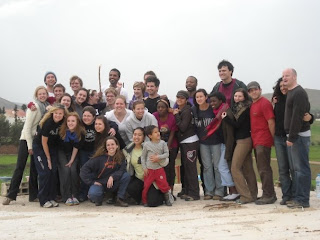
I realize now that my attitude really spoke volumes about how I put limits on the things I felt God could accomplish. So the arrogance was all mine. I am incredibly thankful that God used my time in Morocco to show me that He is not a wasteful God. He would not send 30 people on a trip in His name without using them while they were there to accomplish great things. And although I think I knew that, my definition of “great things” needed to be changed.
Perhaps my definition of “great things” should be expanded to include the smiles of children, the grateful tears of relieved adults and revelations through prayer that God is working in the lives we touch. Perhaps “great things” includes getting a roof built or a room painted or knowing that praying over a child means that God will bless and protect her as she grows. And, perhaps, “great things” includes the moment I look back on the last year of my life and see God’s Sovereign hand in every detail of it.
"As the heavens are higher than the earth,
so are my ways higher than your ways
and my thoughts than your thoughts.
As the rain and the snow
come down from heaven,
and do not return to it
without watering the earth
and making it bud and flourish,
so that it yields seed for the sower and bread for the eater,
So is my word that goes out from my mouth:
It will not return to me empty,
but will accomplish what I desire
and achieve the purpose for which I sent it.”
-Isaiah 55: 9-11
I was floored by this passage and the promise that the rain and snow coming from Heaven do not return to Heaven without not only watering the earth, but also making it bud and flourish. And that rain not only makes the earth bud and flourish but it ALSO provides seed for the sower and bread for the eater.
Several months ago, a friend told me “God wastes nothing”. But it was not until this trip that I truly grasped that promise through these verses. God doesn’t waste groups of 30 people going to a foreign country to serve. And God does not waste anything else. He does not waste my struggles, my hurts, my brokenness, or even my sins. None of that is wasted. All of that will not return to Heaven until it has watered the earth and made it bud and flourish. And not just bud and flourish, but until it has blessed the people around us as well. It will not return to Him empty.
So thankful for this verse.
And so thankful that I can live in the freedom of knowing that the specific details of my story (and yours) will not be wasted in this lifetime.

